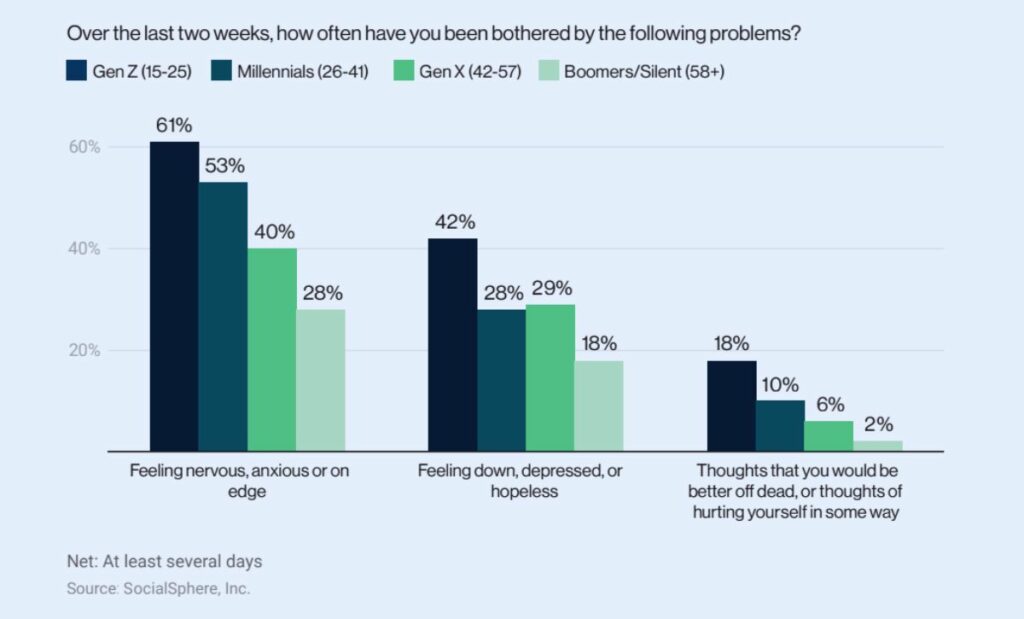CONTENT OVERVIEW
I wrote this in September 2022 for a friend who was starting a magazine on the Gen Z Asian American Life.
Dark Humor and Depression
Laughter as a Radical Act of Resilience
Let’s address the elephant on TikTok: Gen Z’s sense of humor is…concerning.
Their memes are wrapped with a darkness like a thick blanket around your neck: immediately choking, but also oddly comforting. Their jokes make light of the dread of existential crises once reserved for hushed conversations with therapists And their preferred form of communication and sharing experiences is defined by dark humor. But what exactly is dark humor?
Dark humor is like a slap in the face. But it’s a slap that makes you laugh.
It’s a fist bump between tragedy and comedy, a needed breath of fresh air in a hurting world stifled by political correctness. It’s the uncomfortably relatable meme about crippling depression, or a TikToker showing us her current favorite song—blasting from the distorted speakers of an upside-down car, freshly flipped over a guardrail. And often, it’s prefaced with a dire warning: laughing at said video might indeed destine you to hell.
Yet millions consume this potentially damning content
And a quick peek at the comments section (proceed at your own peril) will show you that it’s often controversial and offensive, if taken too far.
So why then the appeal?
Gen Z might shrug and suggest that “it is what it is”, or that life simply “do be like that sometimes”. But perhaps there’s more beneath the morbid memes.
Interestingly enough, a closer look reveals that one’s reaction to dark humor is becoming increasingly divided along generational lines. You see, today’s youth humor stands in stark contrast to the “back in my day” jokes told by elders. As one keen Redditor observed, Boomers trade in lowbrow jokes rooted in judgment, while Gen Z trades in high-minded jokes rooted in self-deprecation. In other words, Boomer humor puts others down, while Millennial and Gen Z humor jokes about wanting to be dead.
This Redditor is onto something.
Research, if it had a (Gen Z) voice, would confirm that these insights were indeed no cap:
While we know that correlation doesn’t mean causation, the increase in use of dark humor significantly parallels the spike in depression. Unfortunately, the prevailing sentiment is that of disdain, with the issue of depression in youth dismissed quickly while quipping “kids these days”—eyeroll may or may not be included.
Cort Rudolph, a psychologist, has studied adult complaints about young people. They’re always the same: “lazy, entitled, self-serving.” John Protzko, another psychologist, calls this a prejudice, a bias that would be unacceptable if directed at ethnic minorities.
Why is this important?
Why is this important? This question isn’t just rhetorical; it’s vital. It’s vital because it shines a spotlight on the minimized significance of the growing prevalence of depression in young people, both in their eyes and the eyes of other generations. It’s a dismissal, a wave of the hand that only serves to deepen the divide.
It makes things worse, leading adults to treat this generation with unhelpful levity and scorn. And worse still, combined with Gen Z’s seemingly immature use of dark humor and memes, they’re treated less seriously and cast in a negative, childish light. But let’s pause for a moment and consider:
Dark Humor isn’t new.
Pop culture brims with examples of dark humor portraying depression in irreverent ways. Memes making light of relentless rumination offer connection through comedy. TV shows like BoJack Horseman and stand-up routines by comedians provide bittersweet catharsis too. Dark humor gives agency over illness, reclaiming power against pressures weighed on the psyche. Mocking misery counters isolation’s inertia; shared laughter fosters community and dismantles the barriers of stigma.
Have you ever connected with those who “just get it”? It makes you feel less lonely.
In other words, history shows that dark humor specifically helps people process adversity. By “comedyzing” tragedy, we gain cathartic release. This is in addition to the physiological and mental benefits of laughter: from boosting immunity to decreasing stress, a good giggle provides quantifiable wellness gains.
But more than the good vibes and happy chemicals offered to their brains, what if their use of dark humor is a window into something deeper?
What if dark humor is a tool for a generation that has seen or felt too much? What if it’s a form of collective resilience: a way to acknowledge the unspeakable—at times unprocessable—pain and still decide to show up, despite the chaos?
Perhaps driving the youth’s response of dark memes and sacrilegious jokes is not a spirit of avoidance, but of an unspoken acknowledgement of shared pain, converted into hopeful humor. Could the coping mechanism that most condemn as tasteless instead help the healing process? I think it can and it does.
Now, this isn’t to say that all forms of dark humor are appropriate or helpful; this isn’t even to say that utilizing dark humor as a form of processing is the most optimal way to heal.
Rather, my point is that this is the first step: understanding the “why” that undergirds Gen Z communication. Only then can we try to put ourselves in the shoes of this generation—a generation that has to process the darkness of the world, on a personal and societal level, at an unprecedented speed. Consider how rapidly they must metabolize tragedy, from school shootings to wars overseas.
Behind every crass joke breathes a commitment to push onward.
So, maybe if we’re willing to consider the context of a generation, we’ll gain the wisdom and empathy we need to communicate in a way that resonates. And we’ll see behind the memes, a generation defined not by darkness or depression, but by an astonishing depth of resilience—a resilience that we could stand to learn from.

